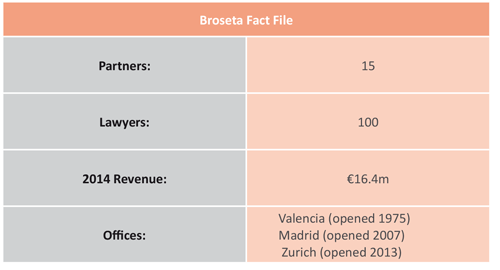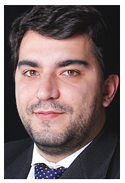Power shift – Broseta
Revenue is increasing at Broseta, but the firm is changing as the balance shifts from its Valencia office to its operation in Madrid
While Broseta was founded as a Valencian firm back in 1975, managing partner Luis Trigo acknowledges that its newer Madrid office – which opened in 2007 – is likely to become the firm´s powerhouse. “Revenues from both offices are similar now, but the natural tendency indicates that, in the coming years, it will be the Madrid office that has the greater weight in terms of revenues,” he concedes. Market sources say this power shift has created tensions between lawyers in the two offices as, metaphorically, the new kid begins to upstage its older sibling. But Trigo paints a picture of a firm at peace with itself. “We manage the firm in an integrated way,” he says. “Therefore, the direction of the firm is not carried from a single headquarters, and there are no specific partners for either city.”
Trigo says the Valencia and Madrid offices are differentiated in the sense they serve different types of clients. “Small and medium-sized enterprises and family businesses with more local needs in Valencia, and bigger companies with global strategies in Madrid,” he adds. “But the essence is the same – we are a boutique with a strategy of sector specialisation, positioned towards the middle market and niche consultancy for large companies.
‘A challenging year´
Although Trigo says that the last year was not easy for the firm, its financial performance suggests that it dealt admirably with what were testing times. “The year 2014 was a very challenging one for Broseta,” he says. “It was a difficult start on the commercial side, but the firm obtained moderate growth in line with the rest of the market.” The firm´s total revenue for 2014 stood at €16.4m, up from €14.9m the previous year, which represented an increase of 10 per cent. Broseta´s corporate and commercial practice contributes around 40 per cent of the firm´s revenue, while litigation and tax each contribute around 20 per cent. The employment department is responsible for a further 10 per cent.
So, with revenue on the rise, what exactly are the challenges to which Trigo refers? “In an environment of growth and an expanding economy, one of the main challenges for firms is the management of talent,” he says. “Each firm must fight to attract and retain the best talent in the market as professional knowledge is the true competitive advantage in this sector.” What is the most effective strategy for winning this war for talent? “Those firms that have managed their talent in the right way during the crisis – by motivating, caring for and creating value for its professionals – are the ones that will be reinforced,” Trigo says.
Partners at many firms now talk of the difficulty of keeping younger lawyers satisfied due to the fact the new generation want a better work life balance. Broseta´s approach to tackling this issue is to give all its lawyers a “career plan” and allow them the flexibility to follow it in a manner that suits them. “It´s about choosing what you want to accomplish, and training is an essential pillar of this,” Trigo says. “The concept of flexibility is very important – in this regard, we promote teleworking and we are flexible about schedule and about where and how the hours are billed by the lawyer.”
 Satisfied lawyers
Satisfied lawyers
Trigo argues it is important that the firm helps its lawyers to maintain a proper work-life balance, while also ensuring the quality of service demanded by clients is provided. He is convinced that it is a strategy that is working. “We believe this is the best way to manage our talent – our level of staff turnover is low and our lawyers are satisfied within our firm.” Broseta currently has 15 partners and 100 lawyers – a recent recruit was Sergio Baches, an EU Competition Law specialist, who became a partner at the firm in December last year after joining from Skadden, Arps, Slate, Meagher & Flom.
Trigo says the firm´s headcount will increase moderately in the coming months. While the firm may make lateral hires, mergers have been ruled out. “We are interested in growth through the integration of teams not firms – there are areas of expertise we understand may be important in the future, experience shows us that hiring specialists and accompanying them with high level professionals, good management and shared values generates very positive synergies.”
“Internationalisation” is identified by Trigo as another of the key challenges facing many firms. As part of its strategy, Broseta opened an office in Zurich in 2013. “Access to international markets is essential in today´s business environment,” says Trigo. “We have a clear international vocation – since the firm began, we have provided advice to Spanish and foreign clients in countries around the world.” Zurich was targeted as an office location because it is one of the most important financial centres in the world, according to Trigo. He adds that the office advises financial institutions and asset managers on their international strategies as well as the conversion of “offshore structures to onshore”. Meanwhile, the Zurich office also advises Spanish and foreign investors in relation to their interests in Spain, Switzerland, and other jurisdictions.
The other key element of Broseta´s international strategy is its membership of the Iberoamerican Legal Network, which currently includes 250 lawyers and spans Colombia, Ecuador, Mexico, Paraguay and Peru. “The purpose of this network is to deepen the knowledge of the countries of the region and their laws, establish new ways of collaboration between Europe and Latin America, and to identify and generate business opportunities leveraging the synergies resulting from collaboration between the offices,” Trigo says. However, he adds that this type of approach may not suit all law firms. “Each firm should analyse what kind of internationalisation model is more optimal.”
Ambitious target
Trigo attributes the growth in the firm´s revenue in the last year to an increase in M&A, tax, real estate, capital markets, competition, and financial consultancy work. However, he adds that there are other types of work that are in decline. “There is decreasing activity in work linked more directly to the crisis, that is, everything related to employment adjustments, bankruptcy, insolvency proceedings and refinancing.”
The outlook for the coming year? Trigo says the firm has set an “ambitious budget” for this year. He adds: “To achieve this budget, we will strengthen those areas where we have more knowledge, such as commercial and tax, and reinforce those with a greater vision of growth, such as M&A, compliance and criminal law – we will also advance the internationalisation model.”
Trigo claims Broseta´s market knowledge and experience are among the firm´s key strengths. “One of the things most valued by our clients is our specialisation, the ability to really know the market and know what the client wants,” Trigo says. “We have professionals with years of experience who can resolve issues more easily in the complex legal environment in which we live, and this is one of our greatest assets.”
Trigo anticipates a successful year for most large and mid-sized law firms, which he believes will post good results in 2015. “There will be increased international demand, but this time with strengthened domestic demand due to increased financing, the resurgence of activity related to construction and public works, increased investment and hiring, and greater outsourcing of services.” Trigo argues innovation will be the key to success. “The firms designing imaginative and innovative models of business will be those that survive.”












